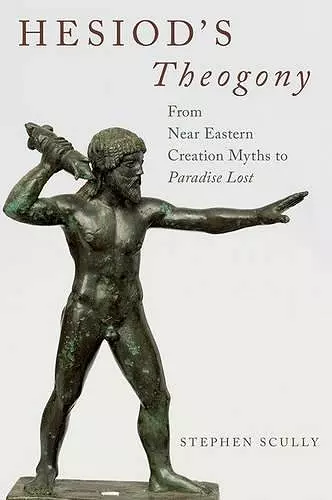Hesiod's Theogony
From Near Eastern Creation Myths to Paradise Lost
Format:Hardback
Publisher:Oxford University Press Inc
Published:8th Oct '15
Currently unavailable, and unfortunately no date known when it will be back

Stephen Scully both offers a reading of Hesiod's Theogony and traces the reception and shadows of this authoritative Greek creation story in Greek and Roman texts up to Milton's own creation myth, which sought to "soar above th' Aonian Mount [i.e., the Theogony] ... and justify the ways of God to men." Scully also considers the poem in light of Near Eastern creation stories, including the Enûma elish and Genesis, as well as the most striking of modern "scientific myths," Freud's Civilization and its Discontents. Scully reads Hesiod's poem as a hymn to Zeus and a city-state creation myth, arguing that Olympus is portrayed as an idealized polity and - with but one exception - a place of communal harmony. This reading informs his study of the Theogony's reception in later writings about polity, discord, and justice. The rich and various story of reception pays particular attention to the long Homeric Hymns, Solon, the Presocratics, Pindar, Aeschylus, Aristophanes, and Plato in the Archaic and Classical periods; to the Alexandrian scholars, Callimachus, Euhemerus, and the Stoics in the Hellenistic period; to Ovid, Apollodorus, Lucan, a few Church fathers, and the Neoplatonists in the Roman period. Tracing the poem's reception in the Byzantine, medieval, and early Renaissance, including Petrarch and Erasmus, the book ends with a lengthy exploration of Milton's imitations of the poem in Paradise Lost. Scully also compares what he considers Hesiod's artful interplay of narrative, genealogical lists, and keen use of personified abstractions in the Theogony to Homeric narrative techniques and treatment of epic verse.
Scully has long been interested in the polis, as his excellent 1990 study, Homer and the Sacred City, demonstrated, and this new volume about Hesiod's Theogony is, in a sense, an extension of that interest. An equally exciting aspect of this comprehensive study is its clear and full discussion of Hesiod's until-now overlooked literary methods, in which personification reflects psychological reality, or flows from action, and in which common nouns, in their shifting meanings, follow the narrative arc of the poem. * Helaine L. Smith, Semicerchio: Rivista di poesia comparata *
The heart of Stephen Scully's book is a masterful inquiry into the place of the Theogony in literary history, in the course of which he makes important observations about the evolution of ancient Greek ideas of the cosmos, divinity, sexuality and gender, justice, and the polis. He prefaces his historical investigations with a careful reading of the poem on its own terms, before looking backward toward its sources and then forward toward the influence it exerted on later texts. Literary analysis and literary history are carefully interwoven, as Scully's initial reading of the poem provides a road map for the historical sections of the book. * Deborah Lyons, American Journal of Philology *
ISBN: 9780190253967
Dimensions: 155mm x 236mm x 28mm
Weight: 544g
288 pages